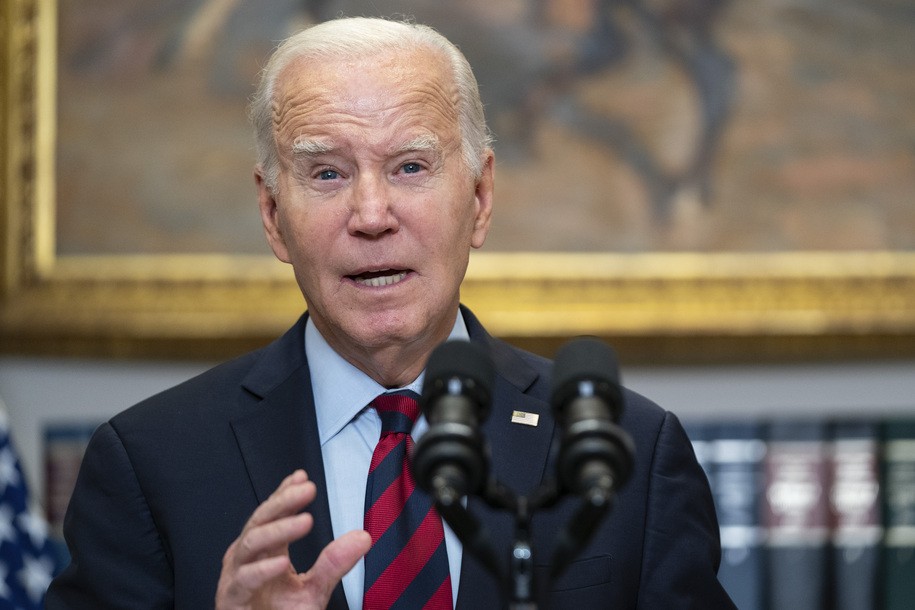Edward-Isaac Dovere/CNN:
How the Biden campaign hopes to make 2024 less about Biden and more about a contrast with Trump
Or, as some of the younger aides on Biden’s reelection campaign have been grimly joking, it’s about when to go “full Hitler” – when the leading Republican candidate’s speeches and actions go so far that the Biden team goes all the way to a direct comparison to the Nazi leader rather than couching their attacks by saying Trump “parroted” him.
The campaign so far, these aides believe, has essentially been Biden running against himself, and losing – with his approval ratings under 40%, anxiety about his age and the Democratic divide over his handling of the war the Israel-Hamas war. But they see the next few weeks of the Republican primary campaigns as an opportunity to persuade influencers and media into thinking about the race on their terms.
Financial Times:
Forget technology — politicians pose the gravest misinformation threat
As we head into a big election year, beware the risks of misleading statements from those at very top
This is set to be a big election year, including in India, Mexico, the US, and probably the UK. People will rightly be on their guard for misinformation, but much of the policy discussion on the topic ignores the most important source: members of the political elite.
…
This basic point is strikingly absent from many policy documents — the NCSC report, for example, has nothing to say about domestic politics. It is not alone. Take the US Surgeon General’s 2021 advisory on confronting health misinformation which calls for a “whole-of-society” approach — and yet contains nothing on politicians and curiously omits the many misleading claims made by the sitting president during the pandemic, including touting hydroxychloroquine as a potential treatment.
Before Bill Johnson’s retirement, Republicans could have three defections and no more. After the 21st, Mike Johnson can only have two GOP defections. Three defections would result in a tie. Since a tie bill does not pass (no VP to the rescue).
Of course, that assumes everyone is present and votes party line. That very often does not happen.
And to help ol’ Mike out, Tom Suozzi (D) is up with an ad hitting his opponent in George Santos’ old NY-03 district, via DCCC:
Ken Block/USA Today:
Trump paid me to find voter fraud. Then he lied after I found 2020 election wasn’t stolen.
The cries that the 2020 election was lost or stolen due to voter fraud continue with no sign of stopping. But if voter fraud had impacted the 2020 election, it would already have been proven.
Can a steady diet of lies and innuendo overcome the truth?
In November 2020, former President Donald Trump asserted that voter fraud had altered the outcome of the 2020 presidential election. The day after the election, his campaign hired an expert in voter data to attempt to prove Trump’s allegations and put him back in the White House.
I am the expert who was hired by the Trump campaign.
The findings of my company’s in-depth analysis are detailed in the depositions taken by the Select Committee to Investigate the January 6th Attack on the United States Capitol. The transcripts show that the campaign found no evidence of voter fraud sufficient to change the outcome of any election. That message was communicated directly to White House chief of staff Mark Meadows.
Brian Klaas/”The Garden of Forking Paths” on Substack:
Why the world isn’t as bad as you think
News coverage is terrible at capturing the biggest good news stories: the long-term trends that show vast improvements in human living standards across long stretches of time. We need to fix that.Pop quiz: what percentage of the global population currently lives in extreme poverty—defined as earning less than $1.90 per day?
Most of us have no clue how to even start to answer that question. Maybe a number floats into your head, but it’s likely a wild guess. The reason is simple: the way we’re given information about the world isn’t designed to make us understand big picture data or long-term trends. Instead, we get information from a 24-hour news cycle, which is a peculiar institution. How does it work? To put it bluntly, it works like this:
The news is mostly an aggregation of every bad event that happened in the last twenty four hours, anywhere on Earth.
That last clause—anywhere on Earth—is particularly important. In the past, citizens in the US, UK, or Australia simply wouldn’t know about a huge number of tragedies unfolding in countless distant parts of the world. Now, we do—almost instantly.
Brian Beutler/Off Message:
My Non-Prediction Predictions For 2024
We’ll be extremely lucky if things turn out half this goodOkay, now for the fun part. Since my 2023 predictions turned out better than I thought they would, I’ve decided to use the power of positive thinking to will a fairly rosy 2024 scenario into existence. Not too rosy, but rosier than the prevailing mood.
Everything below is plausible, with one obvious exception. I hope things come to pass as written or better, because (on a more serious note) whether things turn out okay in the end or not, 2024 is going to be a trying year for everyone who cares about democracy, truth, political equality, and human dignity. Absent swift justice, the outlook for January 1, 2025 is something like 50 percent chance of exhausted relief, 50 percent chance of dread and despair. Given the stakes, I think it helps to keep in mind that Reasonably Decent Things are still possible, and we’re not destined for terrible fates, even if there will never be a big panacea election that delivers us to the promised land.
Happy new year!
Haaretz:
The Woman Who Saved Israel’s Fragile Democracy – for Now
Ex-Supreme Court President Esther Hayut did Israeli society a huge favor on Monday by presiding over the ruling to effectively kill off the government’s judicial overhaul. But Israel remains as divided as ever, and will still be when the war ends
The first and most important conclusion from the ruling is that the Netanyahu government’s judicial overhaul is over. Just before the first anniversary of Justice Minister Yariv Levin’s unveiling of his “legal reform” program last January 4, and after the most turbulent 362 days in Israel’s history, the plot to eviscerate Israel’s Supreme Court and hobble its democracy has failed.
This government will not have the power or the credibility with the public – or most likely the time – to try it again. That doesn’t mean a future right-wing government won’t make another attempt at weakening the judiciary, but it must be hoped that any future constitutional changes will be made in a more consensual manner.


